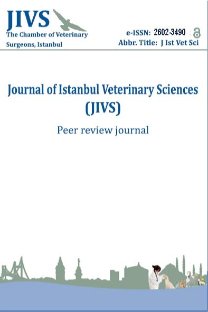Evaluation of the treatment efficacy of flexible-hobble bandage in cats with swimmers syndrome
Evaluation of the treatment efficacy of flexible-hobble bandage in cats with swimmers syndrome
Objective: In this study, we wanted to emphasize that the swimmers syndrome, which is rarely seen in cats, is frequently encountered and can be treated with an easily applied flexible-hobble bandage without reducing patients quality of life. Introduction: Swimmers syndrome is a rare developmental disease seen in neonatal dogs and cats, physiologically delays walking, causes hyperflexion of the coxofemoral joint, especially in the hind legs, and hyperextension of the tibial-patellofemoral and tibiotarsal joints. It’s rarely formed in the front legs and is characterized by swimming-like movement. The diagnosis is made based on the anamnesis and clinical findings. Material and methods: The cases were admitted to Istanbul University-Cerrahpasa Veterinary Faculty Surgery Department Clinics in 2019-2022, and are unable to get up from the ground, spreading their legs sideways. Cases aged between 20 days-4 months, breeds are Scottish Fold, Persian, British Shorthair, and British Shorthair crossbreed, consisting of 9 cats. According to clinical examination findings, diagnosis of swimmers syndrome was made and radiographically evaluated in terms of hip dysplasia and chest flattening/pectus excavatum. A self-adhesive elastic Coban bandage (Petflex, Kruuse, Denmark) and a flexible fixation band (Hypafix, BSN medical, Germany) were applied to the patients lower hobble bandage from the distal tibia, taking into account the hip-width. Since the external rotation from the metatarsals was advanced in Case 6, a hobble bandage was applied over the metatarsal region in addition. Results: Complete recovery was observed in an average of 16 days. Case 1 discontinued the treatment and had permanent moderate abduction and external rotation. Cases 4 and 7 didn’t continue treatment. Case 8 didn’t accept the treatment. The treatment of Case 9 is still ongoing. Successful results were obtained with the application of flexible-hobble bandages in all patients. Conclusion: Contrary to what has been reported, it is understood from our study that syndrome can be seen in kittens quite frequently and encountered especially in Scottish Fold breeds. Early diagnosis, reduces the duration of the treatment and is important for prognosis. The treatment is successful with the flexible-hobble bandage method.
